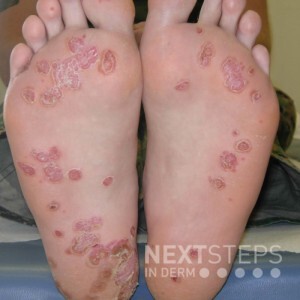
The correct answer is A. HLA-B27.
Reiter syndrome, now referred to as reactive arthritis (ReA), is a condition that most often occurs following enteric or urogenital infections. Reactive arthritis is associated with human leukocyte antigen (HLA)-B27, although HLA-B27 is not always present in individuals who are HIV+. Bacteria associated with reactive arthritis are generally enteric or venereal and include the following: Shigella flexneri, Salmonella typhimurium, Salmonella enteritidis, Streptococcus viridans, Mycoplasma pneumonia, Cyclospora, Chlamydia trachomatis, Yersinia enterocolitica, and Yersinia pseudotuberculosis.
The exact cause of Reiter syndrome remains unknown but it has been identified that people with a particular genetic type called HLA-B27 have an increased chance of developing the syndrome (about 80% of people with Reiter syndrome carry this gene). Having this gene does not mean you will develop Reiter syndrome but it may predispose you to it if you have certain infections.
HLA-B51 is associated with Behcet’s disease.
HLA-DR3 is associated with subacute cutaneous lupus erythematosus.
HLA-DQW2 is associated with dermatitis herpetiformis.
References:
extbook of Dermatology. Ed Rook A, Wilkinson DS, Ebling FJB, Champion RH, Burton JL. Fourth edition. Blackwell Scientific Publications. Schmitt SK. Reactive Arthritis. Infect Dis Clin North Am. 2017 Mar 11.
